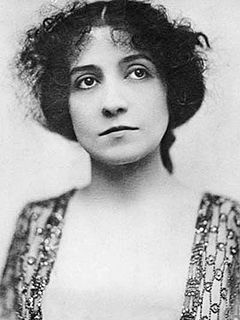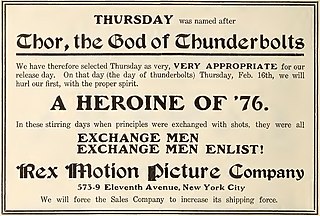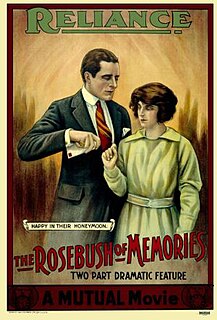
Florence Turner was an American actress who became known as the "Vitagraph Girl" in early silent films.

George Brackett Seitz was an American playwright, screenwriter, film actor and director. He was known for his screenplays for action serials, such as The Perils of Pauline (1914) and The Exploits of Elaine (1914).

The Lubin Manufacturing Company was an American motion picture production company that produced silent films from 1896 to 1916. Lubin films were distributed with a Liberty Bell trademark.

Fritzi Brunette was an American actress.
William J. Butler was an Irish silent film actor. He appeared in 262 films between 1908 and 1917.

Herbert Blaché was a British-born American film director, producer and screenwriter, born of a French mother. He directed more than 50 films between 1912 and 1929.

The Champion Film Company was an independent production company founded in 1909 by Mark M. Dintenfass. The studio was one of the film companies that merged to form Universal Pictures.
Hal Clements was an actor and director of silent films in the U.S. He starred in dozens of silent films. He married writer Olga Printzlau.
The Albuquerque Film Manufacturing Company, also known as the Albuquerque Film Company, was a film company established in New Mexico and soon after reincorporated in Los Angeles during the silent film era. Gilbert P. Hamilton was its president. It was established in 1913 and is known for the 3-reel westerns it produced. They were written by and star Dot Farley. Milton H. Fahrney directed. It also operated in Los Angeles in 1915 before going bankrupt in 1918. The company released its Luna branded filmed through United Film Service.
Gilbert P. Hamilton was an American film company executive and director. He worked at Essanay as a cinematographer, headed the St. Louis Motion Picture Company, and then launched the Albuquerque Motion Picture Company.

Kay-Bee Pictures was a film company. Its executives included Thomas Ince. The company's mottos included "Every picture a headliner" and "Kay-Bee stands for Kessel and Baumann and Kessel and Baumann stands for quality", referring to Adam Kessel and Charles Baumann. It was party of the New York Motion Picture Company and was used after a settlement with rival Universal Pictures to end the film division named 101 Bison. Anna Little was one of its stars.

Rex Motion Picture Company was an early film production company in the United States. Edwin S. Porter was one of Rex's founders after his short lived Defender Film Company failed. Rex produced dozens of films from 1910 into 1917. Rex was one of the studios that combined to form Universal Pictures under Carl Laemmle's leadership.

Albert W. Hale was an early film director and producer in the U.S. He directed some 35 films from 1912 until 1915. He worked for Majestic Studio and National Film Corporation.

Reliance Film Company was an early movie studio in the United States. It was established in 1909 and was bought out a couple years later from Charles O. Baumann, Adam Kessel, and Charlie Kessel

Violet Horner was an American silent film actress. She had several starring roles including in one of the Lena Rivers films released in 1914 and a series of films made with Billy Quirk for Gem Motion Picture Company including Billy's Adventure.

William Robert Daly was an actor and director of silent films in the U.S.
Pallas Pictures was a film studio in the U.S. headed by Frank A. Garbutt. In 1913 the film production company Bosworth Incorporated was founded to release film adaptations of Jack London's stories. Hobart Bosworth was President of the company but as Jack London wrote, "Mr. Garbutt has absolute charge of the entire business of Bosworth, Inc." The company rented studio space until September 1914 when Bosworth Inc. constructed its own studio at 211 N. Occidental Blvd., Los Angeles. When Hobart Bosworth left in 1915 Garbutt assumed full control of Bosworth Inc. Several months later the company was renamed Pallas Pictures, with Melodile Garbutt listed as president of Pallas Pictures. The Pallas logo was a capital "P" with an owl on a branch.

Fred Hornby was a film director and comedic actor in silent films. He also performed in theatrical productions.
Frank Opperman (1861–1922) was an actor in American silent films. In 1916 he was reported to have had a 29 year career on stage and a 7 year film career. Between 1903 and 1907 he appeared three times on Broadway, in Little Lord Fauntleroy, Cashel Byron, and an adaptation of Uncle Tom's Cabin.

Joseph A. Golden was an American pioneer silent film director and screenwriter. His films include A Woman's Wit and Resurrection. No certain information is known about Golden's birth. He began working in film in 1907, directing the one-reel film The Hypnotist's Revenge for American Mutoscope & Biograph.














